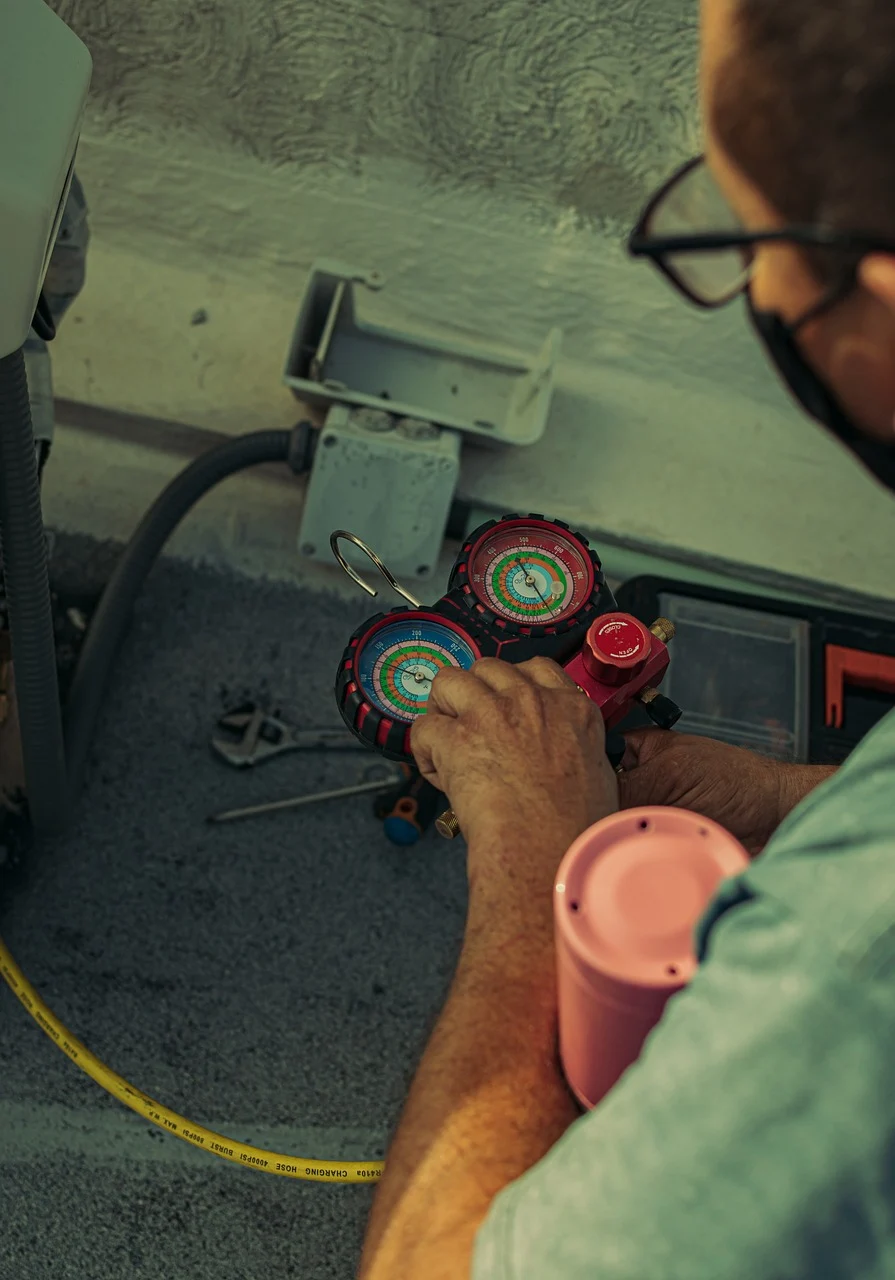June 23, 2023
AC Recharge: Everything You Need to Know About AC Refrigerant for Home

Have you ever wondered what makes your air conditioner tick? What mystical substance is responsible for transforming hot, stale air into a refreshing oasis? The answer lies in the realm of AC refrigerant—the lifeblood of your cooling system. Our air conditioning systems experts at Bowman Mechanical Services are sharing everything you need to know about AC refrigerant for home use and, specifically, the process of AC recharge.
Importance of a Properly Functioning Air Conditioner
A properly functioning central air conditioning unit becomes an essential lifeline during the hot summer months, offering solace and respite from oppressive temperatures. You’ll know quickly if your AC system isn’t cooling properly.
Comfort and Health
Properly functioning air conditioning units regulate humidity levels, preventing excessive moisture that can lead to mold growth and respiratory issues. It filters the air, removing allergens, pollutants, and dust particles, thereby improving indoor air quality and promoting healthier living conditions.
Improved Sleep
A properly functioning HVAC unit creates a conducive sleeping environment by maintaining a cool temperature and reducing excessive noise, enabling us to enjoy quality sleep.
Preservation of Possessions
AC units help protect furniture, electronics, artwork, and other valuable possessions from the damaging effects of moisture, warping, fading, or deterioration.
Enhanced Productivity
When temperatures soar, concentration and productivity can plummet. By creating a comfortable working environment, a properly functioning home AC unit improves focus, cognitive abilities, and overall work performance.
Safety and Dehydration Prevention
Extreme heat can pose serious health risks, including dehydration, heat exhaustion, and heatstroke. A properly functioning air conditioner helps mitigate these risks by maintaining a cool indoor temperature, reducing the likelihood of heat-related illnesses.
How Does an Air Conditioner Work?
An air conditioner works by utilizing the refrigeration cycle, which involves four main components: the evaporator coil, compressor, condenser coil, and expansion valve.
The evaporator coil absorbs heat from indoor air, the compressor raises the temperature and pressure of the refrigerant gas, the condenser coil releases heat to the outdoor air, and the expansion valve regulates the flow of refrigerant. This cycle allows for the transfer of heat from inside to outside, cooling the indoor air and creating a comfortable environment.
Role of Refrigerant in the Cooling Process
The refrigerant plays a vital role in the cooling process of an air conditioner, and AC freon is crucial for its optimal performance.
Heat Absorption and Release
Refrigerant is a chemical compound responsible for absorbing heat from the indoor air and releasing it outdoors. During the cooling process, the refrigerant transitions between different states (gas and liquid) to facilitate heat exchange.
Evaporator Coil
Inside the indoor unit, the refrigerant flows through the evaporator coil. As warm indoor air passes over the coil, the refrigerant absorbs the heat from the air, causing it to evaporate and turn into a gas. This absorption of heat cools the air that is then circulated back into the living space.
Compressor
The compressor compresses the refrigerant gas, significantly raising its temperature and pressure. This process increases the energy level of the refrigerant, preparing it for the next phase of the cooling cycle.
Condenser Coil
The high-pressure, high-temperature refrigerant gas from the compressor moves to the condenser coil in the outdoor unit. As the gas flows through the coil, it releases heat to the outdoor air, causing the refrigerant to condense back into a liquid state. This heat release completes the cooling cycle.
Importance of AC Freon
AC freon is a specific type of refrigerant designed for air conditioning systems. It provides efficient heat transfer properties and is crucial for optimal AC performance. The right amount and type of AC Freon are necessary to maintain the cooling capacity and efficiency of the system.
Understanding AC Recharge
Over time, AC freon may deplete or leak, affecting the cooling efficiency of the air conditioner. Regular system maintenance, including AC recharge, as a form of HVAC tune-up service, ensures that the refrigerant levels are adequate and the system operates optimally.
Signs That Indicate the Need for an AC Recharge
Let’s explore some of the common signs that indicate your AC unit is in need of maintenance services for a recharge.
Insufficient Cooling
If you notice that your AC isn’t providing the same level of cooling as before or if it takes longer to reach the desired temperature, it may indicate a refrigerant deficiency. Insufficient refrigerant levels can hinder the system’s ability to absorb and release heat, resulting in reduced cooling capacity.
Longer Cooling Cycles
If your air conditioner runs for extended periods to achieve the desired temperature, it could be due to low refrigerant levels. Insufficient refrigerant restricts the system’s efficiency, causing it to work harder and longer to cool the space.
Warm Air From Vents
When an AC is blowing warm air from its vents instead of the expected cool air, it could be an indication of low refrigerant levels. Insufficient refrigerant limits the cooling capacity of the system, leading to the circulation of warm air.
Exploring AC Freon for Home Use
Understanding the basics of AC freon and its significance in residential use is important for homeowners to ensure optimal performance and efficiency of their air conditioners.
What is AC Freon?
Freon is a specific brand of refrigerant but the term has been adopted by many professionals to simply refer to many types of refrigerant gasses. Refrigerant is a chemical compound used in air conditioning systems to absorb heat from indoor air and release it outdoors, thus facilitating the cooling process. It undergoes a cycle of evaporation and condensation to transfer heat effectively.
Different Types of Refrigerants Commonly Used in Home Air Conditioners
In modern home air conditioning systems, different types of refrigerants are commonly used, with a focus on those that have a lower environmental impact and better energy efficiency.
Here are a few examples:
- R-410A (Puron): R-410A is a hydrofluorocarbon (HFC) refrigerant widely used in newer air conditioning systems. R-410a is a popular replacement for the older and less efficient R-22.
- R-32: R-32 is another HFC refrigerant that is gaining popularity in newer air conditioning systems for its lower global warming potential (GWP).
- R-134a: R-134a is a hydrofluorocarbon (HFC) refrigerant with a lower ozone depletion potential compared to older refrigerants like R-12.
Newer refrigerants, like R-410a, are much more efficient than older ones, such as R-22. See the comparison of R-410a and R-22 here.
Identifying and Addressing Refrigerant Leaks
Identifying and addressing refrigerant leaks in air conditioners is crucial for maintaining optimal cooling performance and energy efficiency.
Common Causes of Refrigerant Leaks in Air Conditioners
Some of the causes of refrigerant leaks include:
- Age and Wear
- Corrosion
- Poor Installation
- Vibrations or Physical Damage
Common Signs and Symptoms of a Refrigerant Leak
Here are some common signs your refrigerant may be leaking and affecting the performance of your air conditioning unit:
- Reduced Cooling Performance
- Longer Cooling Cycles
- Hissing or Bubbling Sounds
- Frozen AC Coil
Steps to Detect and Locate Leaks
Some of the techniques used to inspect your HVAC system for leaks are:
- Visual Inspection: A thorough visual inspection of the air conditioning system can help identify signs of refrigerant leaks, such as oil stains, frost accumulation, or corrosion on components.
- Pressure Testing: HVAC professionals can conduct pressure tests to determine if there are any leaks in the system. This involves pressurizing the system with a tracer gas or nitrogen and using leak detection tools to identify any leaks.
- UV Dye Test: Injecting a UV dye into the system allows for easier detection of leaks. The dye circulates with the refrigerant, and when UV light is used, it reveals the location of the leak through fluorescence.
Professional Repair Options
When it comes to hiring a professional HVAC technician for cooling systems repairs, there are several approaches you can take to have professional contractors get your unit up and running again:
- Leak Repair: Once a leaking refrigerant is detected and located, HVAC professionals can repair the leak by replacing or repairing the affected component. This may involve soldering, sealing connections, or replacing damaged parts.
- Refrigerant Recharge: After the leak is repaired, the HVAC technician will recharge the air conditioning system with the appropriate amount of refrigerant to restore optimal levels.
- Preventative Maintenance: Regular maintenance and inspections by HVAC professionals can help prevent refrigerant leaks by identifying potential issues early and addressing them promptly.
If you know you have a leak and your AC isn’t cooling properly, there are a few alternative ways you can cool your home.
FAQs about AC Recharge and AC Freon:
Can I recharge my AC myself?
It is not recommended to recharge your AC yourself because AC recharge involves handling refrigerants and requires specialized tools and knowledge. It’s best to leave AC recharging to trained HVAC professionals for safety and optimal results.
How often should AC recharge be done?
In general, if your AC is functioning properly, it should not require frequent recharging. If you suspect a refrigerant leak or notice reduced cooling performance, it’s best to consult a professional to assess and address the issue.
Is AC Freon harmful to the environment?
Traditional AC Freon, such as R-22, can harm the environment by contributing to ozone depletion. Newer refrigerants, like R-410A, have a lower environmental impact and are considered more eco-friendly.
Can I put Freon in my AC unit myself?
No, putting freon (refrigerant) in your AC unit yourself is not recommended. Handling refrigerants requires specialized knowledge, equipment, and proper certification. It’s essential to have a trained HVAC professional handle the recharging process to ensure safety, accuracy, and compliance with environmental regulations.
Experience Superior HVAC Maintenance Services with Bowman Mechanical
At Bowman Mechanical, we take pride in providing exceptional HVAC maintenance services that prioritize the comfort and satisfaction of our customers. With our team of highly skilled technicians and our commitment to quality workmanship, you can trust us to keep your HVAC systems running smoothly and efficiently.
Contact our Raleigh HVAC experts today by calling us at 919-944-4603 or filling out the contact form below to get started.

